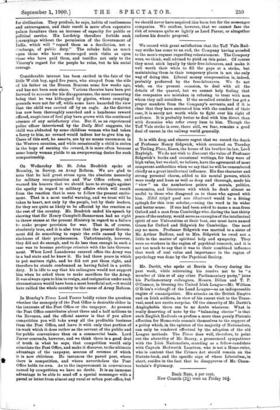Mr. Davitt, who spoke at Borne in ()Emory during the
past week, while reiterating his resolve not to be "a member of this or of any other Parliamentary party," joins his Parliamentary colleagues, Messrs. Dillon and T. P. O'Connor, in blessing the United Irish League—Mr. William O'BI ien's rjchaub of the Land League—as an indispensable engine of emancipation. His attacks on the British Empire and on Irish soldiers, in view of his recent visit to the Trans- vaal, need not excite surprise. Of the sincerity of Mr. Davitt'a Anglophobia there can be no doubt whatever. What is really deserving of note by the "balancing elector" is that such English Radicals as profess a more than purely Platonic affection for Home-rule commit themselves to the support of a policy which, in the opinion of the majority of Nationalists, can only be rendered effectual by the adoption of the old League methods. The Times does well, therefore, to point out the absurdity of Mr. Storey, a pronounced sympathiser with the Irish Nationalists, standing as a fellow-candidate with Captain Hedworth Lambton, who is not a Home-ruler, who is content that the Crimes Act should remain on the Statute-book, and the specific sign of whose Liberalism, in short, resides in the fact that he disapproves of Mr. Cham- berlain's diplomacy.


































 Previous page
Previous page